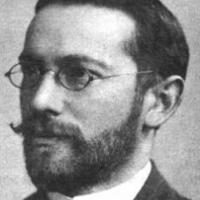
Tarrasch Sacs Two Bishops and Nimzowitsch
Siegbert Tarrasch (pictured) was born March 5, 1862 and died February 17, 1934. Around 1890, he was the best or one of the four best players in the world. In 1908, he clearly lost a match for Emanuel Lasker’s world championship (+3 =5 -8). Tarrasch spread and added to the ideas of Wilhelm Steinitz and was called the Teacher of Germany. His opponent in this game was Aron Nimzowitsch. He was born November 7, 1886 and died March 16, 1935. Nimzowitsch was 24 years younger than Tarrasch which was reflected in the positive record Nimzowitsch achieved against his powerful, but declining rival. This game was played in the preliminary at St. Petersburg 1914. The final standings after ten games were: Capablanca 8 (undefeated), Tarrasch 6.5, Lasker 6.5, Marshall 6, Alekhine 6, Rubinstein 5, Bernstein 5, Nimzowitsch 4, Janowski 3.5, Blackburne 3.5, Gunsberg 1. The top five then played a double round robin, which required eight rounds. The final score was Lasker 7 (undefeated), Capablanca 5, Alekhine 4, Tarrasch 2, Marshall 2.
In the Nimzowitsch-Tarrasch game, the opening is the Queen’s Gambit Declined. Nimzowitsch used the common move 2.Nf3. The main line is 2.c4 e6 3.Nc3, which appears in the ECO code as D31-69. Tarrasch used the setup for Black called the Tarrasch Defense, characterized by c5 and found in D32-34. When Nimzowitsch did not play Nc3, but Nbd2, the game remained in D30. Tarrasch was awarded the 2nd Brilliancy Prize for this game. Capablanca-Bernstein, which was won by White, won the 1st Brilliancy Prize. Tarrasch criticized that choice and pointed out errors in that game. It is believed that Tarrasch was denied the top award because his brilliant sacrifice of two bishops to expose the white king was the theme already demonstrated by White in Lasker-Bauer, Amsterdam 1889 and was therefore not original. If Tarrasch had played the “less brilliant” and yet faster 19.Bxg2!, perhaps he would have received the higher prize, or perhaps that better method would not have been brilliant enough. In the years since the game, various chess writers have stated that Tarrasch deserved the 1st Brilliancy Prize. I cannot reprize the game, but I can reprise it here.






